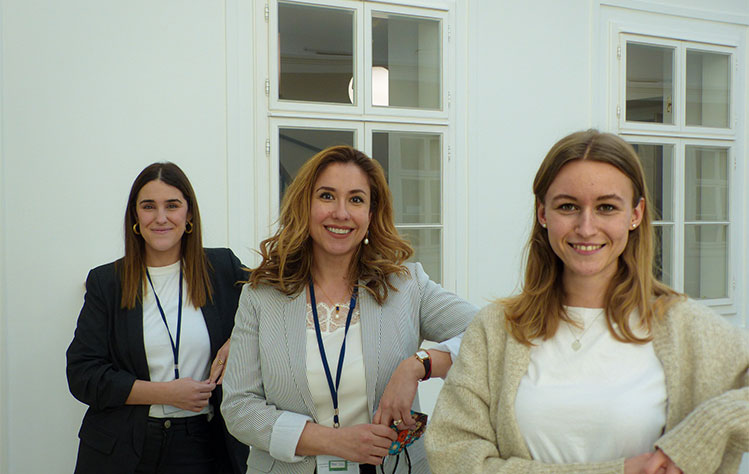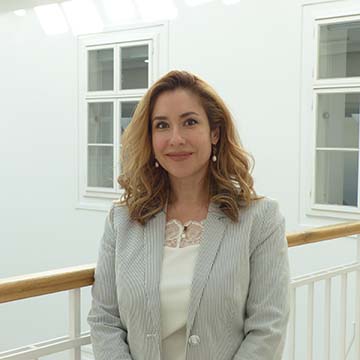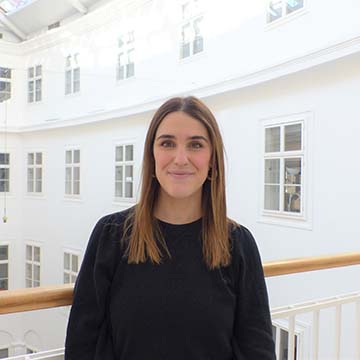WVPU celebrates women on the occasion of International Women's Day
March 08, 2022

Submitted by Webster Vienna Private University
In celebration of International Women's Day on March 8, we caught up with three of our wonderful women on campus to learn more about their efforts, opinions and beliefs regarding gender equality, women in science and women in the workplace. Read on and be inspired by these successful individuals
Sasha Tremblay
Language Center Coordinator
Country of origin: Canada
 As a woman, mother, colleague, and professional Sasha surely is a force to be reckoned
with. We asked her the following three questions and what assiduous answers!
As a woman, mother, colleague, and professional Sasha surely is a force to be reckoned
with. We asked her the following three questions and what assiduous answers!
1. Throughout your career and studies, what challenges have you faced that were perhaps different to those faced by your male colleagues?
As a working mother of two children, I have found it challenging to balance the demands of motherhood with my career development, an experience shared by my friends and many other women in the same situation. Even though gender inequalities are increasingly addressed across Europe, North America, and elsewhere, there is still greater pressure placed on women to carry out the bulk of the housework and the childrearing duties (which regarding the latter, I take on fully and voluntarily), while at the same time maintaining their careers. For me personally, I have been fortunate enough and supported in raising my children while also continuing my career, but not without a sense that it has been more challenging to find opportunities for self-development or career growth compared to male colleagues. At the end of the day, I think the expression “motherhood is a fulltime job” needs to be normalized even more!
2. Which female authors are your favorites when reading for leisure?
Margaret Atwood and Isabel Allende are two of my favorite authors, who simply happen to be women. Their stories have a quality to them that is not only readable, but
transportive to the worlds they create within their novels. While Allende’s writing is typically more focused on real events and historical atrocities, Atwood can create a foreboding world of her own in her writing, which I find fascinating. And it certainly feels good that one of these world-renowned female authors, is also a fellow Canadian!
3. What issues are women still facing regarding gender inequality in today’s progressive societies?
I think that the issue of discrimination against women’s capabilities not only by men but by women themselves, will need to be more greatly addressed as progressive societies move towards true gender equality and the integration of women in positions of power. Interestingly, the application procedures for any position regardless of gender are entirely the same, academic and professional requirements are identical for both genders, and opportunities for advancement and growth are presented equally in progressive societies to men and women. However, women rarely apply to positions perceived as “high powered” for a variety of legitimate reasons such as family commitments, but also the ‘imposter syndrome’ experienced by many women who feel that they are less qualified than their male counterparts in any given competition. So, I think that despite significant and continuing advancements in reducing gender inequalities, more work around the perception of ‘female power’ in today’s progressive societies, still exists. For men, and women – equally working towards equality.
Lara Jenko
Undergraduate Student (Business Management, Psychology)
Country of origin: Slovenia
 Today Lara is tackling the responsibilities of the SGA president as well as her traineeship
in the Admissions office. Nevertheless, she took her time to answer our questions,
so read along as our student body representative tells us about her experiences and
opinions!
Today Lara is tackling the responsibilities of the SGA president as well as her traineeship
in the Admissions office. Nevertheless, she took her time to answer our questions,
so read along as our student body representative tells us about her experiences and
opinions!
1. As the SGA president this semester, how might your approach to the responsibilities be different as a woman?
I personally don’t feel any pressure as a female SGA president. There have been many other women in this position before. I was able to learn from them and see how things are done. I think this also positively represents our environment at Webster Vienna. We have a very diverse community and equality is key. Moreover, the Working Group and Equal Opportunities (WGEO) has been doing a great job, as I feel their efforts are improving the experience of our students, staff, and faculty. We are happy to also have added a student representative from the SGA to the WGEO group from last semester, so we together can reach our goals and further advocate for equality and diversity.
2. During your time at Webster Vienna, what are some of the most inspiring women you’ve met? (Students, staff, faculty)
When I first joined SGA, Loren Sandoval, now a Webster Vienna alumna, was president. I have always admired her. She is successful in all aspects. Not only was she doing great in academics, but she was also always ready to help. I have learned a lot from her, and I am glad I have met here at WVPU.
Furthermore, I find Alexandra Deubner’s work very practical. I think it is inspiring to listen to her lectures, speeches, and advise as she constantly remains positive and hopeful. To be encouraged by a strong and successful woman like her works like a charm. You’d be surprised by the wonders that women supporting each other can do. The courage you get from someone believing in you and hyping you up to do your best – it is simply wonderful.
3. Why do you find celebrating International Women’s Day important?
All people should be equal, and Women’s Day helps spread awareness of that - it’s like a gender equality reminder. There are still so many inequalities related to gender, from pay gap, to free will to marriage, percentage of woman in leadership positions and many more. I believe celebrating women every year helps spread awareness and helps us make a difference. I’m thrilled to hear that Webster Vienna is going to participate in this celebration with our own events to make sure we support, encourage, and empower all the great women on campus.
Ana Gonzalez
Junior Admissions Officer
Country of origin: Portugal
 Ana, thorough and honest answers, is providing us with food for thought and inspiration
to how we need to stand and speak up for gender equality and societies’ (and our own)
detrimental norms.
Ana, thorough and honest answers, is providing us with food for thought and inspiration
to how we need to stand and speak up for gender equality and societies’ (and our own)
detrimental norms.
1. Throughout your career what has been a challenge you’ve had to overcome as a woman?
For centuries, women have been trying to set free from norms and standards set by society. Marching for equality, fighting for our rights, getting a good job, having the perfect balance between family and career. Perhaps because of this we have developed a strong syndrome of perfectionism. This has of course extended to the workplace as well.
I read somewhere that women tend to apply to a new job only if they meet 100% of the qualifications, while men apply even if they meet just 50%. This shows how critical we can be with ourselves, and how high we tend to set our own bar.
In the past, I have had episodes of anxiety and the feeling that I was failing to meet society’s unrealistically high standards. It took me a long time to realize that this pressure was mostly generated by myself, rather than by society alone.
My tip to all young women, in the workplace or in life in general, is to remember that everyone is on a learning curve, and we are supposed to keep reinventing ourselves throughout our entire life. Actively aligning your values, dreams and goals with your work and lifestyle can be done; just be patient with yourself and remember personal happiness is the greatest measure of success.
2. Who comes to mind when you think of a powerful, independent, and intelligent woman?
There are obviously so many examples at different scales that is difficult to choose one admirable role model.
I would like to highlight Rosa Parks, mainly known for refusing to give up her seat on a bus in Alabama in 1955, who became one of the images of the civil rights movement. I would say any women who influences people in a good way is a role model. Rosa Parks found her voice and used it, in a time where it required a lot of courage to do so. She is a good example to remind us to speak up, to be awake and to not just navigate passively through life. If there are things that need to be changed, we must remember change can start with us.
“Each person must live their life as a model for others” – Rosa Parks
3. How do you believe we should be celebrating the International Women’s Day?
International Women’s Day has been celebrated since 1911. Although honouring women is something that should happen every day, we can use this date to appreciate the incredible models who fought for our civil rights, to highlight magnificent examples around us, and respect how far we have come. A lot has changed in the everyday lives of women over the past 100 years, but still a lot remains to be debated regarding gender parity in our society.
I believe that we can go a long way just by coming together for a chat around gender equality and share our personal experiences. And bring men into the conversation as well!
Positive narratives build trust and encourage people to lift each other up. Focusing on the women around us and highlighting their personal and professional achievements will not only empower them but also bring more awareness to any barriers they may face. The idea is to bring achievements to light and enabling positive change.
